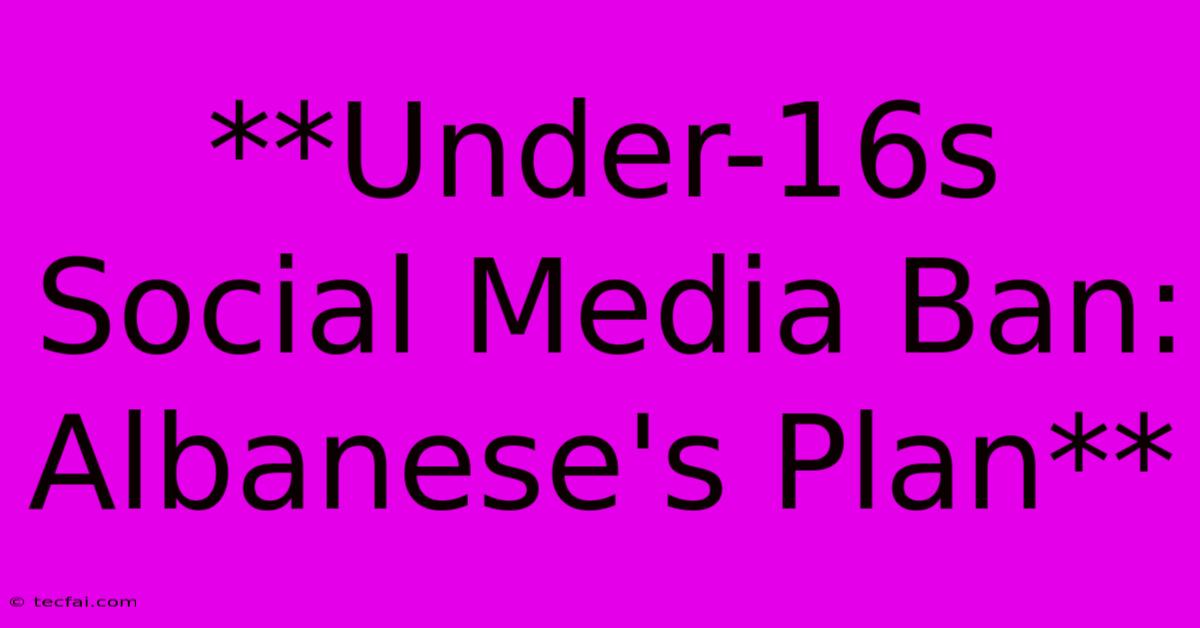**Under-16s Social Media Ban: Albanese's Plan**

Discover more detailed and exciting information on our website. Click the link below to start your adventure: Visit Best Website tecfai.com. Don't miss out!
Table of Contents
Under-16s Social Media Ban: Albanese's Plan and the Debate It Sparked
The Australian government's proposed ban on under-16s using social media platforms has sparked a heated debate. Prime Minister Anthony Albanese has unveiled a plan to tackle the potential harms associated with social media use among young people, but the details and implementation remain unclear. This article will explore the proposed ban, the concerns it addresses, and the criticisms it has faced.
Addressing the Harms of Social Media for Children
The proposed ban is driven by concerns regarding the negative impacts of social media on young minds. These concerns include:
- Mental Health: Studies have linked excessive social media use to increased rates of anxiety, depression, and body image issues in teenagers.
- Cyberbullying: The anonymity of online platforms can embolden cyberbullying, which can have devastating consequences for young victims.
- Privacy and Data: Children may not fully comprehend the implications of sharing personal data online, making them vulnerable to exploitation and privacy breaches.
- Addiction and Sleep Disruption: Social media's addictive nature can interfere with sleep patterns and academic performance, particularly among younger users.
The Proposed Ban: What Does It Mean?
The government's plan is still in its early stages, and specific details are yet to be announced. However, key aspects include:
- Age Verification: Platforms would need to implement robust age verification systems to ensure compliance with the ban.
- Enforcement Mechanisms: The government is considering various mechanisms to enforce the ban, including penalties for platforms that fail to comply.
- Exemptions: Some potential exemptions have been proposed, such as for educational purposes or when supervised by parents.
A Complex Issue: Criticisms and Counterarguments
The proposed ban has attracted both support and criticism. Critics argue:
- Lack of Clarity: The lack of specific details about the ban raises concerns about its effectiveness and feasibility.
- Privacy Concerns: Some worry that age verification systems could compromise user privacy or be vulnerable to breaches.
- Free Speech Concerns: Critics question the government's right to restrict access to online platforms for children.
- Real-world Impact: They argue that the ban might not address the underlying issues driving social media harms, such as family dynamics and social pressures.
Supporters of the ban argue that it is a necessary step to protect children from the potential harms of social media. They emphasize the vulnerability of young minds to online manipulation and the importance of safeguarding their mental well-being.
Looking Ahead: The Future of Social Media and Children
The proposed ban on under-16s using social media is a complex issue with no easy answers. It requires careful consideration of both the potential benefits and risks of online platforms for children.
The debate surrounding this proposal highlights the need for a nuanced approach to regulating social media use among young people. Ultimately, any solution must prioritize the safety and well-being of children while respecting their right to online expression and participation.
Further discussions and public consultation are crucial to refine the proposed ban and ensure that it is effective, feasible, and respects the rights of all involved.

Thank you for visiting our website wich cover about **Under-16s Social Media Ban: Albanese's Plan**. We hope the information provided has been useful to you. Feel free to contact us if you have any questions or need further assistance. See you next time and dont miss to bookmark.
Featured Posts
-
Walzs Plans After Vice President Bid
Nov 07, 2024
-
Cfia Recalls Breads And Buns Metal Contamination
Nov 07, 2024
-
Daniel Barlow Height How Tall Is He
Nov 07, 2024
-
Arsenals Rice Injured Aims For Chelsea Match
Nov 07, 2024
-
Global Markets Brace For Us Election Outcome
Nov 07, 2024
